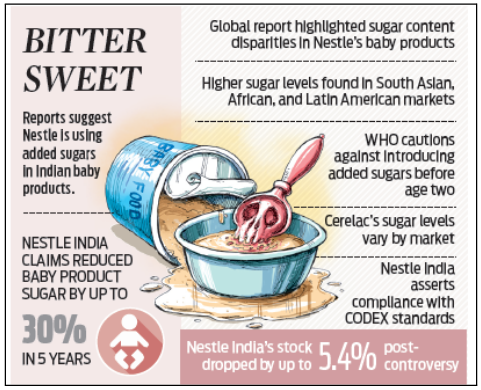News Excerpt:
Nestle’s baby food products sold in India have higher sugar content, in comparison to the same products sold in European markets, according to a report released recently by a Swiss NGO, the Public Eye and International Baby Food Action Network (IBFAN).
What does the report say?
- The report claims that Nestle’s wheat-based product, Cerelac, which is sold without any added sugars in the UK and Germany, contained 2.7 grams of added sugar per serving in India.
- Cerelac is a brand of instant cereal for babies.
- The highest sugar content was found to be 7.3 grams in samples from the Philippines, where the information was not even declared on the packaging, the report said.

What is Nestle’s defence?
- Nestle India has responded to the allegation, saying that the reduction of added sugars is a priority for the company.
- According to the company, over the last five years, added sugars have been reduced by up to 30% in its infant cereal products.
- Company claims that it ensures that its products manufactured in India are in full and strict compliance with CODEX standards (a commission established by WHO and FAO) and local specifications (as required) pertaining to the requirements of all nutrients including added sugars.
- Nestle sold over ₹20,000 crore worth of Cerelac products in India in 2022.
What are added sugars?
- Added sugars are sweetening agents such as syrups that are added in processed foods and beverages.
- They are considered to be more harmful than the naturally occurring sugars found in fruits and milk.
- When sugar is added to baby formula food, babies are much more likely to drink it up because of the pleasing taste.
- With happy parents purchasing the products, it boosts the bottomline of companies. And they can get by because the regulations are weak in India.
Why are added sugars harmful?
- The WHO advises against the introduction of added sugars before the age of two years to prevent addictive eating habits.
- Exposure to added sugars can lead to weight gain, obesity and an increased risk of developing chronic diseases such as type 2 diabetes, heart disease and certain types of cancer later in life.
- Additionally, high sugar consumption in infancy has been associated with an increased risk of dental caries (tooth decay) and poor nutrient intake, as sugary foods often displace more nutritious options in a child’s diet.
What do Indian guidelines say?
- They do not prescribe any upper limit for added sugars. The regulations allow use of corn syrup and malt in cereal-based infant food.
- Despite World Health Organisation (WHO) recommendations against added sugar in foods meant for children under the age of three years, Indian regulators do allow a limited amount of sucrose and fructose in baby food.
- It also allows the use of sucrose and fructose as a carbohydrate source, provided it makes up less than 20% of the carbohydrates in the food.
- The Food Safety and Standards Authority of India, which regulates the manufacture, storage, distribution, sale, and import of food articles, while also establishing standards to ensure food safety, said that it is looking into the IBFAN report.
